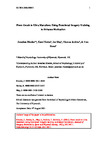From couch to ultra marathon: using functional imagery training to enhance motivation

Date
2021-08-16Author
Subject
Metadata
Show full item recordAbstract
Objectives
This study evaluates ultra-marathon runners’ use of goal-setting, self-talk, and imagery as strategies to help them through the challenge of long-distance running.
Methods
In stage one, thirty-one self-professed non-runners were recruited and received motivational interviewing (MI) in a group setting, examining their motivation to get healthy. In stage two, five months later, participants were asked if they would consider running an ultra-marathon, and fifteen (M
age=39.47, SD=5.84) agreed. At this point participants were randomly split into an MI or Functional Imagery Training (FIT) group. FIT teaches participants how to master goal centred imagery by controlling attention and elaboration. Groups received similar contact hours and completed four measures that assess grit, resilience, self-efficacy, and imagery ability at baseline and after the race.
Results
We found no significant differences between measures for finishers and non-finishers or between groups or over time. However, the likelihood of completing the ultra-marathon was five times as likely in the FIT group, than in MI (RR=5.25). Grit and resilience scores were strongly correlated. By receiving FIT, there was a significant association (p=0.04) to complete the ultra-marathon.
Conclusions
FIT is a relatively cost-effective method to increase exercise adherence through multi-sensory elaboration of goal setting and overcoming barriers or challenges.
Collections
Publisher
Journal
Volume
Issue
Pagination
Recommended, similar items
The following license files are associated with this item:


